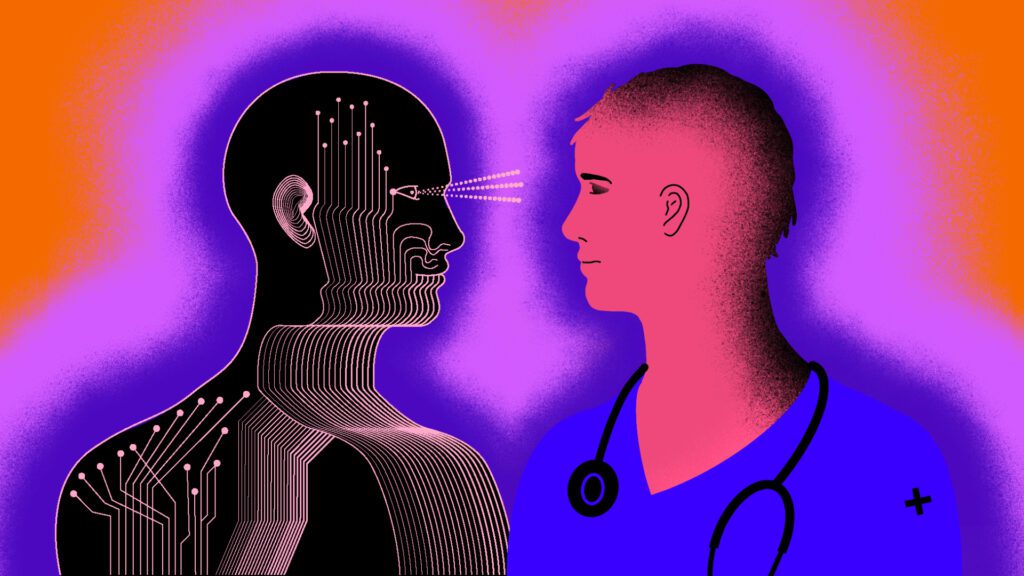The Transformative Power of AI in Healthcare: A Nurse’s Perspective
The landscape of healthcare is shifting rapidly, primarily propelled by the advancing capabilities of artificial intelligence (AI). While many celebrate these innovations, there are concerns about how they redefine roles within this vital sector. Neuro-intensive care nurse Michael Kennedy from San Diego shares his viewpoint, shedding light on what AI’s growing presence means for patient care.
A Day in the Life
Every morning at 6:30 AM, Michael boards the trolley from downtown San Diego to the La Jolla hospital where he works. Despite the area’s limited public transport options, he finds it convenient and enjoyable. A typical 12-hour shift often extends to 13 hours, allowing little room for anything beyond the rigors of his demanding role.
In the neuro-intensive care unit, Michael frequently encounters patients who have just undergone critical neurosurgeries. These cases often involve extended recovery periods where patients struggle to regain fundamental skills. For Michael, witnessing patients at their most vulnerable—often without immediate resolution—is both challenging and deeply rewarding.
The Rise of AI in Healthcare
Historically, nursing has relied on intuition—an instinctive understanding of patient needs that goes beyond medical data. Yet, Michael notes that AI has begun to overshadow this vital human element. Over the years, technology has infiltrated hospitals, starting with features designed to monitor and remind nurses of essential procedures. These tools aimed to ensure patients received the care they needed but have evolved into something much more complex.
In 2018, the introduction of an AI program to predict patient acuity shifted the landscape significantly. What was once a straightforward assessment based on nursing observations has become an AI-driven process where scores are generated from various patient notes. The transition left many nurses like Michael feeling disempowered, questioning the reliability of a score devoid of context or clarity.
He recalls the day the changes took effect: “One day, it was taken away from us. Instead, they bought this AI-powered program… We had no idea where these numbers were coming from. It felt like magic, but not in a good way.” This drastic change left nurses unable to advocate effectively for their patients’ needs, stripping them of both agency and clarity.
Concerns Over Trust and Surveillance
As if this weren’t enough, recent developments at Michael’s hospital—including the hiring of a chief AI officer and the roll-out of Ambient Documentation technology—have raised alarms. This system promises to record and summarize every patient interaction, which many nurses view as intrusive surveillance rather than support.
“We leafletted our colleagues to try to educate them on what ‘Ambient Documentation’ actually means,” explains Michael. Concerns run deep, centered on patient privacy and the unrealistic portrayal of technology that aims to solve physician burnout. Many see these innovations as thinly veiled attempts to squeeze more productivity from caregivers rather than genuinely support patient care.
A Cautionary Tale
The narrative emerging from Michael’s account embodies a broader concern—one that casts doubt on the implications of prioritizing efficiency over hands-on care. With hospital systems increasingly designed to serve management efficiencies, patients may suffer from diminished human oversight.
“Nurses are being viewed as operators of the machines, rather than the skilled professionals we are,” Michael asserts. “The goal seems to be to enhance efficiency, but in doing so, they might be compromising patient safety.”
In Michael’s view, the essence of nursing—critical thinking, intuition, and personalized care—must not be sacrificed at the altar of algorithm-driven decision-making. He worries that as new nurses enter the field with alerts dictating their every move, they may fail to develop the same instinctual skills that define the profession.
Navigating the Future
The embedment of AI in healthcare isn’t merely a trend; it’s a major shift that poses considerable questions about the future of patient care and nursing. While the allure of efficiency through technology is appealing, it’s essential to strike a balance between innovation and the invaluable human touch that defines quality healthcare.
Ultimately, Michael’s story is a clarion call to ensure that as we embrace AI, we don’t lose sight of the empathy and intuition that make healthcare meaningful.
The AI Buzz Hub team is excited to see where these breakthroughs take us. Want to stay in the loop on all things AI? Subscribe to our newsletter or share this article with your fellow enthusiasts.




